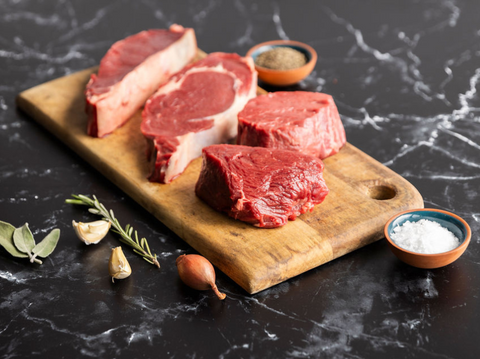There’s nothing quite like a perfectly cooked steak. Unfortunately, those can be few and far between if you’re trying to improve your health, lose weight or reduce your environmental impact.
Well, we have good (and research-backed) news for you: Bison and elk are healthier red meats, even in comparison to grass-fed beef. Because they’re native species, they also have a lighter environmental footprint - but that’s another topic for another post.
Okay, so maybe buffalo has an edge over beef, but is buffalo meat good for you? Let’s dive in.
Nutritional Profile of Buffalo Meat vs. Beef
Using nutritional information from the U.S. Department of Agriculture database, here’s how 4 ounces (113 grams) of ground, raw bison meat and grass-fed beef differ:

As you can see, there are less calories in buffalo meat. It’s also lower in fat, including saturated fat, and higher in protein and iron.
Is bison meat low in cholesterol? According to the Academy of Nutrition and Dietetics, bison meat is relatively low in cholesterol. That same 4-ounce serving of buffalo meat has about 60 milligrams of cholesterol vs. 70+ milligrams for a 4-ounce serving of grass-fed beef.
Both bison meat and beef are good sources of beta-carotene, vitamins B6 and B12 and minerals, such as zinc, selenium and phosphorus.
Keep in mind that the nutritional values depend on numerous factors, including the specific cut of meat. Let’s look at the fat content in two of our favorite cuts side by side:

What the Research Says About Bison Meat
In 2010, a longitudinal observational study assessed the impact of eating buffalo meat by dividing participants into three groups of 100 (non-consumers of buffalo meat, recent consumers of buffalo meat and regular consumers of buffalo meat). After 12 months, regular consumers had a better blood lipid profile with lower levels of total cholesterol and higher levels of HDL (good cholesterol) than non-consumers and recent consumers.
A 2013 study published in the journal Nutritional Research noted that one of the major health benefits of bison meat is a better ratio of polyunsaturated fatty acids (PUFA) to saturated fatty acids (SFA) as compared to beef. Buffalo also had higher levels of conjugated linoleic acid (CLA) and three to four times more anti-inflammatory omega-3 PUFA.
This same study compared the effects of eating grass-fed beef vs. bison meat over seven weeks. They found the chronic consumption of bison was associated with a reduced cardiovascular health risk and, unlike beef, bison consumption didn’t cause increased inflammation and oxidative stress or decreased vascular function.
The study’s authors concluded that bison is a “healthier red meat alternative.”
The Health Benefits of Bison Meat
Now that we’ve compared the nutritional profile of bison meat vs. beef, what does it all mean for your health? Here are some of the key bison meat benefits:
Buffalo meat has high-quality, bioavailable protein, iron and zinc, all of which are essential for energy and immunity.
Bison meat has a healthier fatty acid profile than beef, which is why eating it doesn’t cause inflammation like other red meats. It may even lower inflammation and reduce the risk of certain cancers thanks to anti-inflammatory omega-3 polyunsaturated fatty acids, CLA and selenium.
The vitamins and minerals in bison, particularly zinc, help with wound healing and protect your DNA.
The B vitamins and omega-3s in buffalo meat support optimal brain function and overall well-being.
Lean, unprocessed proteins like bison meat help build muscle and keep you feeling full longer. While more research needs to be done, some studies indicate CLA could also enhance lean muscle mass, reduce body fat and promote muscle metabolism.
Protein might get most of the hype when talking about the health benefits of bison meat, but it’s full of B vitamins too, including B12, which you can only get from animal sources. B12 is vital for nerve function and the formation of red blood cells. Deficiency can lead to anemia and neurological issues.
The studies cited above support the fact that regularly consuming bison meat can reduce the risk of cardiovascular disease and promote healthy cholesterol levels.
But How Does it Taste?
Just because bison is healthy doesn’t mean you’ll sacrifice taste. Buffalo meat has a rich, meaty flavor and tastes clean and slightly sweet.
At Jackson Hole Buffalo Meat Co., our products are made with responsibly raised, North American buffalo that graze on grasslands. You can rest assured you’re getting the highest quality, all-natural meat possible.
Ready to Enjoy the Health Benefits of Bison Meat?
From our hand-cut buffalo ribeyes to our house-ground buffalo burgers, we have options for all preferences and palates. Shop our premium bison meat products for nutrition and flavor in every bite.


